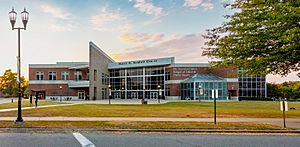Joycelyn Elders facts for kids
Quick facts for kids
Joycelyn Elders
|
|
|---|---|
 |
|
| 15th Surgeon General of the United States | |
| In office September 8, 1993 – December 31, 1994 |
|
| President | Bill Clinton |
| Preceded by | Robert A. Whitney (acting) |
| Succeeded by | Audrey F. Manley (acting) |
| Personal details | |
| Born |
Minnie Lee Jones
August 13, 1933 Schaal, Arkansas, U.S. |
| Political party | Democratic |
| Children | at least 1 son |
| Education | Philander Smith College (BS) UA Little Rock (MD, MS) |
| Military service | |
| Allegiance | |
| Branch/service | |
| Years of service | Army: 1953–56 USPHS: 1993–94 |
| Rank | Vice Admiral |
Minnie Joycelyn Elders (born Minnie Lee Jones; August 13, 1933) is an American pediatrician and public health administrator who served as Surgeon General of the United States from 1993 to 1994. A vice admiral in the Public Health Service Commissioned Corps, she was the second woman, second person of color, and first African American to serve as Surgeon General.
She is currently a professor emerita of pediatrics at the University of Arkansas for Medical Sciences.
Contents
Early life and education
Elders was born Minnie Lee Jones in Schaal, Arkansas, to a poor, farm sharecropping family, and was the eldest of eight children, and valedictorian of her school class. The family also spent two years near a wartime shipyard in Richmond, California before returning to Schaal. In college, she changed her name to Minnie Joycelyn Lee. In 1952, she received her B.S. degree in Biology from Philander Smith College in Little Rock, Arkansas, where she also pledged Delta Sigma Theta. She married briefly to Cornelius Reynolds, a Federal employee, and later to Oliver Elders, a basketball coach. After working as a nurse's aide in a Veterans Administration hospital in Milwaukee for a period, she joined the United States Army in May 1953 and became a 2nd Lieutenant. During her 3 years in the Army, she was trained as a physical therapist. She then attended the University of Arkansas Medical School, where she obtained her M.D. degree in 1960. After completing an internship at the University of Minnesota Hospital and a residency in pediatrics at the University of Arkansas Medical Center, Elders earned an M.S. in Biochemistry in 1967.
Director of Arkansas Department of Health
In 1987, then-governor Bill Clinton appointed Elders as Director of the Arkansas Department of Health, making her the first African-American woman in the state to hold this position. Some of her major accomplishments while in office include a tenfold increase in early childhood screenings from 1988 to 1992 and a 24 percent rise in the immunization rate for two-year-olds; and an expansion of the availability of HIV testing and counseling services, breast cancer screenings, and better hospice care for the elderly. In 1992, she was elected President of the Association of State and Territorial Health Officers.
Experiences with racism
Elders believed that opposition to her Surgeon General nomination was driven by sexism and racism. "Some people in the American Medical Association, a certain group of them, didn't even know that I was a physician. They were passing a resolution to say that from now on every Surgeon General must be a physician—which was a knock at me. ... They don't expect a black female to have accomplished what I have and to have done the things that I have."
During an interview, she was asked if she related to Shirley Chisholm's statement about feeling more oppressed as a woman than as an African American, and replied by saying, "I am who I am because I'm a black woman."
Surgeon General of the United States
Elders has received a National Institutes of Health career development award, also serving as assistant professor in pediatrics at the University of Arkansas Medical Center from 1967. She was promoted to associate professor in 1971 and professor in 1976. Her research interests focused on endocrinology, and she received board certification as a pediatric endocrinologist in 1978, becoming the first person in the state of Arkansas to do so. Elders received a D.Sc. degree from Bates College in 2002.
In January 1993, Bill Clinton appointed her as the United States Surgeon General, making her the first African American and the second woman (following Antonia Novello) to hold the position.
Resignation
In December 1994, Elders was forced to resign by President Clinton. Clinton's chief of staff, Leon Panetta, remarked, "There have been too many areas where the President does not agree with her views."
A collection of Elder's professional papers is held at the National Library of Medicine in Bethesda, Maryland.
Post-governmental activities

Since leaving her post as Surgeon General, Elders has returned to the University of Arkansas for Medical Sciences as professor of pediatrics, and is currently professor emerita at UAMS.
Elders was inducted into the Arkansas Women's Hall of Fame in 2016.
In 2015, Philander Smith College, Elders' alma mater, established the Dr. Joycelyn Elders School of Allied and Public Health.
In 1997, Elders published a memoir.
She received a Candace Award from the National Coalition of 100 Black Women in 1991. She was inducted into Omicron Delta Kappa as an honoris causa initiate at SUNY Plattsburgh in 1996.
See also
 In Spanish: Joycelyn Elders para niños
In Spanish: Joycelyn Elders para niños

